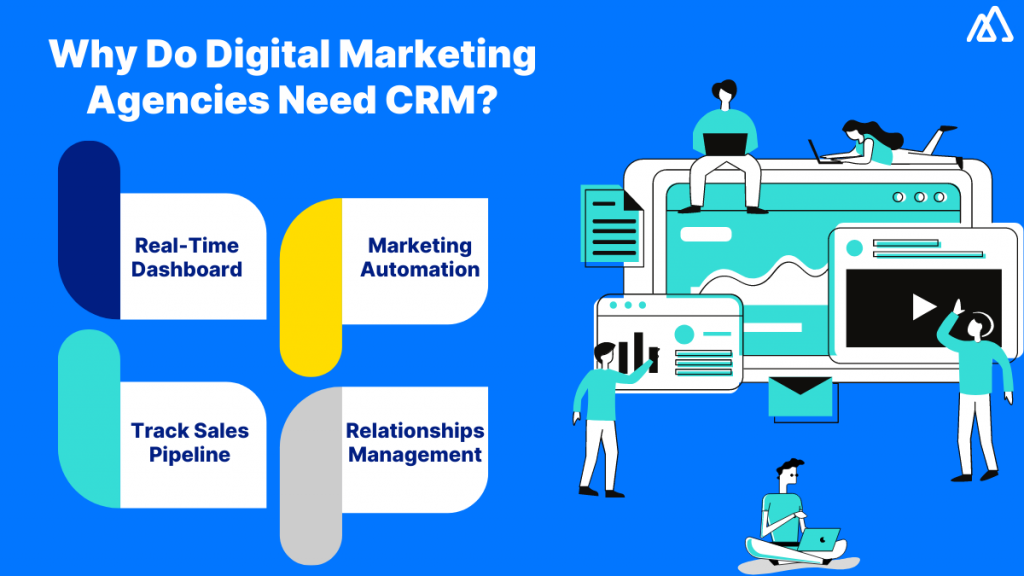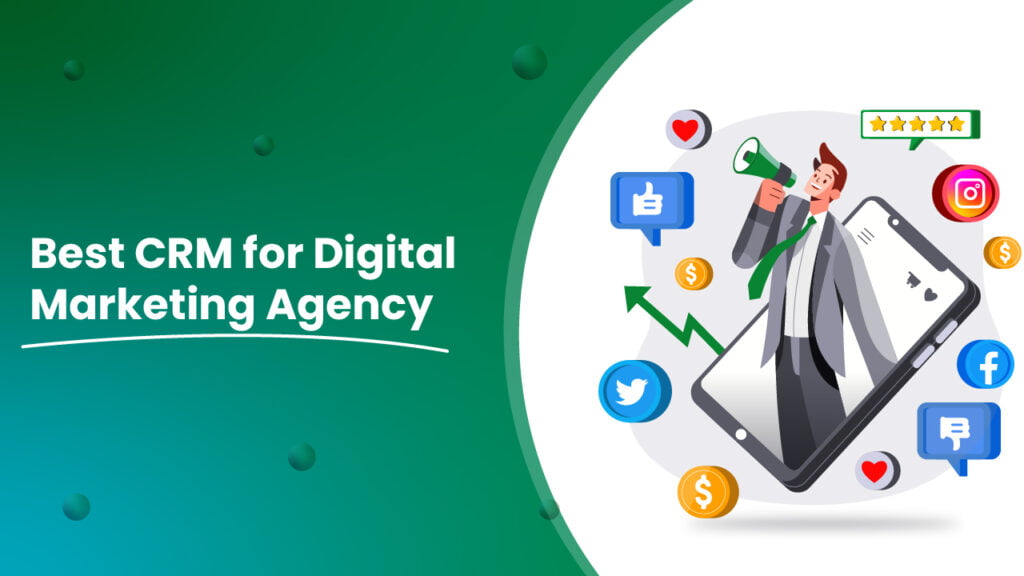
CRM: The Digital Marketing Agency’s Secret Weapon for Growth
In the fast-paced and competitive world of digital marketing, agencies are constantly seeking ways to optimize their operations, improve client relationships, and drive revenue growth. While creativity and strategic expertise are essential, the right technology can be a game-changer. Customer Relationship Management (CRM) systems have emerged as a critical tool for digital marketing agencies, offering a centralized platform to manage client interactions, streamline workflows, and gain valuable insights. This article will explore the vital role of CRM in empowering digital marketing agencies to thrive in the modern landscape.
The Unique Challenges Faced by Digital Marketing Agencies
Digital marketing agencies face a unique set of challenges that distinguish them from other businesses. Understanding these challenges highlights the necessity of a robust CRM solution:
- Managing Multiple Clients and Campaigns: Agencies juggle a diverse portfolio of clients, each with unique goals, strategies, and campaign timelines. Keeping track of all these moving parts without a centralized system can lead to chaos, missed deadlines, and client dissatisfaction.
- Demonstrating ROI and Value: Clients demand tangible results and expect agencies to demonstrate the value of their services. Agencies need to track campaign performance, generate insightful reports, and communicate the ROI effectively to retain clients and secure new business.
- Maintaining Consistent Communication: Effective communication is paramount in the agency-client relationship. Agencies need to maintain consistent and personalized communication across multiple channels, including email, phone, social media, and project management platforms.
- Streamlining Internal Workflows: Digital marketing agencies involve various departments, including content creation, SEO, social media, paid advertising, and design. Coordinating these teams and ensuring seamless workflows is crucial for efficiency and profitability.
- Staying Ahead of the Curve: The digital marketing landscape is constantly evolving, with new technologies, platforms, and best practices emerging regularly. Agencies need to stay updated on the latest trends and adapt their strategies accordingly.
How CRM Solves Agency Challenges
A well-implemented CRM system addresses these challenges by providing a centralized platform for managing client relationships, streamlining operations, and gaining valuable insights. Here’s a detailed look at the benefits:
- Centralized Client Data Management: CRM systems consolidate all client information in one place, including contact details, communication history, project status, contracts, and performance data. This centralized view allows agency teams to access the information they need quickly and efficiently, eliminating the need to search through multiple spreadsheets or emails.
- Improved Communication and Collaboration: CRM facilitates seamless communication and collaboration between agency teams and clients. It provides a centralized platform for tracking all interactions, including emails, phone calls, meetings, and project updates. This ensures that everyone is on the same page and reduces the risk of miscommunication or missed deadlines.
- Streamlined Sales and Onboarding Processes: CRM helps agencies streamline their sales and onboarding processes by automating tasks such as lead tracking, proposal generation, and contract management. This allows sales teams to focus on building relationships and closing deals, while onboarding teams can ensure a smooth and efficient client experience.
- Enhanced Project Management: Many CRM systems integrate with project management tools, allowing agencies to track project progress, manage tasks, and allocate resources effectively. This helps agencies stay on schedule and within budget while delivering high-quality work.
- Data-Driven Decision Making: CRM systems provide agencies with valuable data and insights into client behavior, campaign performance, and overall business performance. This data can be used to make informed decisions about marketing strategies, resource allocation, and business development.
- Improved Client Retention: By providing personalized service, proactive communication, and demonstrable results, CRM helps agencies build stronger client relationships and improve client retention rates. Happy clients are more likely to renew their contracts and recommend the agency to others.
- Automated Marketing Efforts: CRM systems can be integrated with marketing automation tools to streamline marketing campaigns, personalize email marketing, and nurture leads. This helps agencies generate more leads, improve conversion rates, and drive revenue growth.
- Enhanced Reporting and Analytics: CRM provides robust reporting and analytics capabilities, allowing agencies to track key performance indicators (KPIs), measure campaign effectiveness, and demonstrate ROI to clients. This helps agencies prove the value of their services and secure new business.
Key CRM Features for Digital Marketing Agencies
When selecting a CRM system for a digital marketing agency, it’s crucial to consider specific features tailored to the agency’s unique needs:
- Lead Management: Capture, track, and nurture leads from various sources, including website forms, social media, and marketing campaigns.
- Contact Management: Maintain a comprehensive database of client contacts with detailed information, communication history, and relationship mapping.
- Opportunity Management: Track potential deals, manage sales pipelines, and forecast revenue accurately.
- Project Management Integration: Seamless integration with project management tools like Asana, Trello, or Monday.com to track project progress and manage tasks.
- Email Marketing Integration: Integrate with email marketing platforms like Mailchimp or HubSpot to create and manage email campaigns.
- Social Media Integration: Connect with social media platforms to monitor brand mentions, track engagement, and manage social media campaigns.
- Reporting and Analytics: Generate customizable reports to track KPIs, measure campaign effectiveness, and demonstrate ROI to clients.
- Automation: Automate repetitive tasks such as lead scoring, email follow-ups, and task assignments.
- Client Portal: Provide clients with a secure online portal to access project updates, reports, and communication history.
- Customization: The ability to customize the CRM to fit the agency’s specific workflows and processes.
Choosing the Right CRM for Your Agency
Selecting the right CRM system is a critical decision. Here are some factors to consider:
- Agency Size and Needs: Consider the size of your agency, the number of clients you manage, and the specific features you need.
- Budget: CRM systems range in price from free to enterprise-level. Determine your budget and choose a system that offers the best value for your money.
- Integration Capabilities: Ensure the CRM integrates with the other tools your agency uses, such as project management software, email marketing platforms, and social media management tools.
- Ease of Use: Choose a CRM that is easy to learn and use, so your team can quickly adopt it and start seeing results.
- Scalability: Select a CRM that can scale with your agency as it grows.
- Customer Support: Look for a CRM provider that offers excellent customer support and training resources.
Popular CRM Options for Digital Marketing Agencies:
- HubSpot CRM: A popular choice with a free version and powerful marketing automation features.
- Salesforce Sales Cloud: A robust CRM with advanced customization options.
- Zoho CRM: A cost-effective CRM with a wide range of features and integrations.
- Pipedrive: A sales-focused CRM designed for small businesses.
- Agile CRM: An all-in-one CRM with marketing automation, sales automation, and service desk features.
Implementation and Best Practices
Implementing a CRM system is not just about installing software; it’s about changing the way your agency operates. Here are some best practices for successful implementation:
- Define Clear Goals: Before implementing a CRM, define your goals and objectives. What do you want to achieve with the CRM?
- Involve Your Team: Get your team involved in the selection and implementation process. This will help ensure buy-in and adoption.
- Data Migration: Clean and migrate your existing data into the CRM.
- Training and Support: Provide comprehensive training and support to your team.
- Customize the CRM: Customize the CRM to fit your agency’s specific workflows and processes.
- Monitor and Evaluate: Continuously monitor and evaluate the performance of your CRM.
Conclusion
In today’s competitive digital marketing landscape, a CRM system is no longer a luxury but a necessity for agencies that want to thrive. By centralizing client data, streamlining operations, and providing valuable insights, CRM empowers agencies to improve client relationships, drive revenue growth, and stay ahead of the curve. By carefully selecting and implementing the right CRM system, digital marketing agencies can unlock their full potential and achieve sustainable success. The ability to provide data-driven results and personalized service will be the key differentiator for agencies in the future, and CRM is the cornerstone of that strategy.

